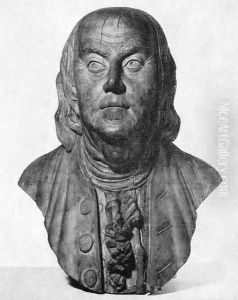William Rush Paintings
William Rush was an American sculptor from the late 18th and early 19th centuries, widely considered to be the first major American sculptor. Born on July 4, 1756, in Philadelphia, Pennsylvania, Rush began his career as a ship carver in a city that was a bustling center for shipbuilding. His early work largely involved decorative figureheads for ships, which combined utilitarian function with artistic embellishment.
Rush's talent and skill grew with his experience, and he soon became known for his full-scale figure sculptures. During the American Revolutionary War, he served in the militia and continued to practice his craft. After the war, he became one of the founders of the Pennsylvania Academy of the Fine Arts in 1805, which was the first art school and museum in the United States.
Rush's sculptures often reflected the neoclassical style, which was popular during his time, and he is particularly noted for his wooden allegorical figures representing the Schuylkill River, which were originally created for a waterworks in Philadelphia. These works showcased his ability to blend classical forms with American themes. Despite the popularity of neoclassicism, Rush's work retained a certain robustness and directness that reflected his beginnings as a ship carver.
Throughout his career, William Rush received numerous commissions for portrait busts, public monuments, and ornamental carvings. His contributions to American art were significant in that he helped to establish a distinctly American voice in sculpture during the post-Revolutionary period. In many ways, his work laid the groundwork for the development of sculpture in the United States.
William Rush passed away on January 17, 1833, in Philadelphia. Although not as widely known today as some of his contemporaries, his work remains an important part of early American art history and his influence is still recognized among art scholars and historians. The Pennsylvania Academy of the Fine Arts continues to preserve his legacy, holding several of his pieces in its collection.
